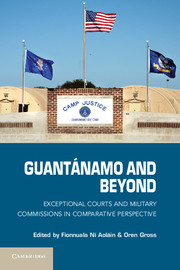Book contents
- Frontmatter
- Contents
- Contributors
- Acknowledgments
- Introduction: Guantánamo and Beyond
- Part I Military Commissions and Exceptional Courts in the United States
- Part II Exceptional Courts and Military Commissions Elsewhere
- 9 The Law Working Itself Pure? The Canadian Experience with Exceptional Courts and Guantánamo
- 10 Vicious and Virtuous Cycles in Prosecuting Terrorism
- 11 Terrorism Prosecution in the United Kingdom
- 12 Trying Terrorists
- 13 Exceptional or Not? An Examination of India's Special Courts in the National Security Context
- Part III International Law, Exceptional Courts, and Military Commissions
- Index
- References
9 - The Law Working Itself Pure? The Canadian Experience with Exceptional Courts and Guantánamo
Published online by Cambridge University Press: 05 June 2014
- Frontmatter
- Contents
- Contributors
- Acknowledgments
- Introduction: Guantánamo and Beyond
- Part I Military Commissions and Exceptional Courts in the United States
- Part II Exceptional Courts and Military Commissions Elsewhere
- 9 The Law Working Itself Pure? The Canadian Experience with Exceptional Courts and Guantánamo
- 10 Vicious and Virtuous Cycles in Prosecuting Terrorism
- 11 Terrorism Prosecution in the United Kingdom
- 12 Trying Terrorists
- 13 Exceptional or Not? An Examination of India's Special Courts in the National Security Context
- Part III International Law, Exceptional Courts, and Military Commissions
- Index
- References
Summary
CANADA HAS NOT BEEN IMMUNE FROM THE USE OF exceptional courts or the legal and political controversies that often accompany their use. Canada did not use its newly enacted antiterrorism law to prosecute suspected terrorists in the ordinary criminal courts for three years after 9/11. Instead, it relied on administrative detention under immigration law that had not been used extensively before 9/11. Security certificates issued under immigration law are subject to review by specially designated judges of the Federal Court. Although the Federal Court is a regularly constituted superior court that hears civil and administrative claims against the federal government, it was an exceptional court in the context of security certificates because of the use of specially designated judges who examine secret evidence submitted by the government, but never disclosed to the detainee. The justifications offered for such use of the Federal Court are the familiar ones for exceptional courts: the need for secrecy; the expertise of specially selected judges trained in security matters; and the difficulties of criminal prosecutions in open court before juries. Security certificates have resulted in long-term and indefinite detention and have been politically and legally controversial. Indeed, some have criticized them as a milder Canadian version of Guantánamo. In any event, security certificates have been the subject of successful challenges under the Canadian Charter of Rights and Freedoms (hereinafter the Charter). In this way, the Canadian security certificate cases provide a case study of exceptional courts that have been successfully resisted and reformed.
- Type
- Chapter
- Information
- Guantánamo and BeyondExceptional Courts and Military Commissions in Comparative Perspective, pp. 201 - 224Publisher: Cambridge University PressPrint publication year: 2013
References
- 1
- Cited by



